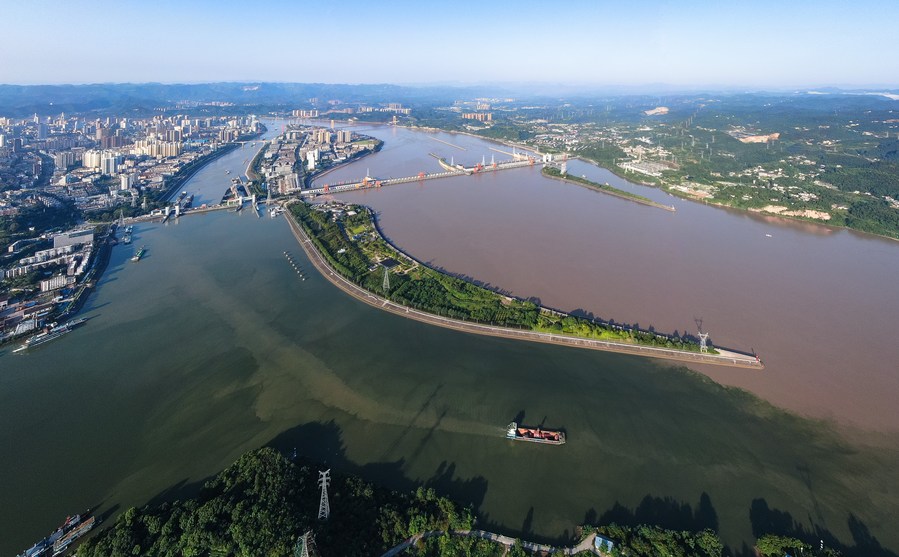Yangtze River belt thriving under reforms


China has made strong progress in promoting high-quality, green development of the Yangtze River Economic Belt as it ramps up efforts to conserve Asia's longest watercourse.
In the first three quarters of last year, monitoring found that 90.6 percent of water in the belt-which covers nine provinces and two municipalities-was suitable for drinking, the National Development and Reform Commission said in a statement released on Tuesday.
The proportion of high-quality water was 8.8 percentage points higher than the national average. It also represented a 1.8 percentage point year-on-year improvement in the belt area, the country's top economic planner said.
The quality of economic development in the belt has also been rising, the commission said.
During the three quarters, the belt saw its contribution to the country's GDP climb 10.6 percent to 38.26 trillion yuan ($6 trillion), it said. The belt accounted for 46.7 percent of total GDP, up 0.1 percentage point year-on-year.
The figures show win-win achievements in environmental protection and socioeconomic development, the commission added, following the country's sustained endeavors to boost the growth of the belt as a national strategy put forward by China's central leadership.
Green development of the economic belt has been a key concern of President Xi Jinping. While presiding over a meeting on the economic belt in Chongqing on Jan 5, 2016, he said it is one of the country's key strategies to boost growth in the belt.
The status and role of the river and the economic belt mean development must prioritize ecology and green development to respect natural, economic and social rules, Xi stressed.
He said the Yangtze River boasts a unique ecological system. To restore its ecological environment will be an extremely important task, and no large-scale development will be allowed along the river at present and for a long period to come.
Xi also chaired another two symposiums on the economic belt, in Wuhan, Hubei province, in April 2018 and in Nanjing, Jiangsu province, in November 2020.
At the Nanjing symposium, Xi said efforts should be made to strengthen the protection and restoration of ecological and environmental systems and coordinate work on the upper, middle and lower reaches of the Yangtze River.
He also called for comprehensively improving the efficiency of resource utilization and accelerating green and low-carbon development based on the premise of strictly protecting the ecological environment.
Series of actions
The commission said local authorities along the economic belt have undertaken a series of actions to implement Xi's instructions.
Over the past six years, around 63,000 kilometers of sewage pipes have been checked for environmental hazards, it said. Local governments have also constructed or renovated about 8,500 km of sewage pipes, which help collect 61 percent of urban domestic wastewater in the belt for disposal.
Efforts have also been stepped up to close, relocate or upgrade chemical factories, reduce fertilizer consumption, and control waste from livestock farms, along with cracking down on illegal sand exploitation and the haphazard development of small hydropower stations.
The economic belt has also made great achievements in the control of desertification and soil erosion, thanks to the afforestation of almost 1.2 million hectares of land, the commission said.
After a 10-year fishing moratorium came into effect in all of the Yangtze's natural waterways at the start of 2021, a cross-department and regional law enforcement mechanism was established in the Yangtze River Basin, it said.
With illegal fishing essentially curbed thanks to the mechanism, "the highly endangered Yangtze finless porpoise has been spotted more frequently in the river", it added.
The Chishui River, a major tributary of the Yangtze where the fishing ban was introduced four years earlier, has seen its fish stocks improve. "The level of fish stocks in the Chishui River is 1.95 times the level before the fishing ban was imposed. The situation for aquatic organism resources has been gradually improved," the commission said.
- Surging flu cases drive up demand for drug
- Nanchang funds 19 free funeral venues after tragedy
- Massive ice sculpture replicates CNS?Liaoning aircraft carrier
- China to enhance to improve carbon footprint
- Experts advocate vaccinations to combat flu cases
- Singer Lu Han apologizes for inappropriate behavior





































